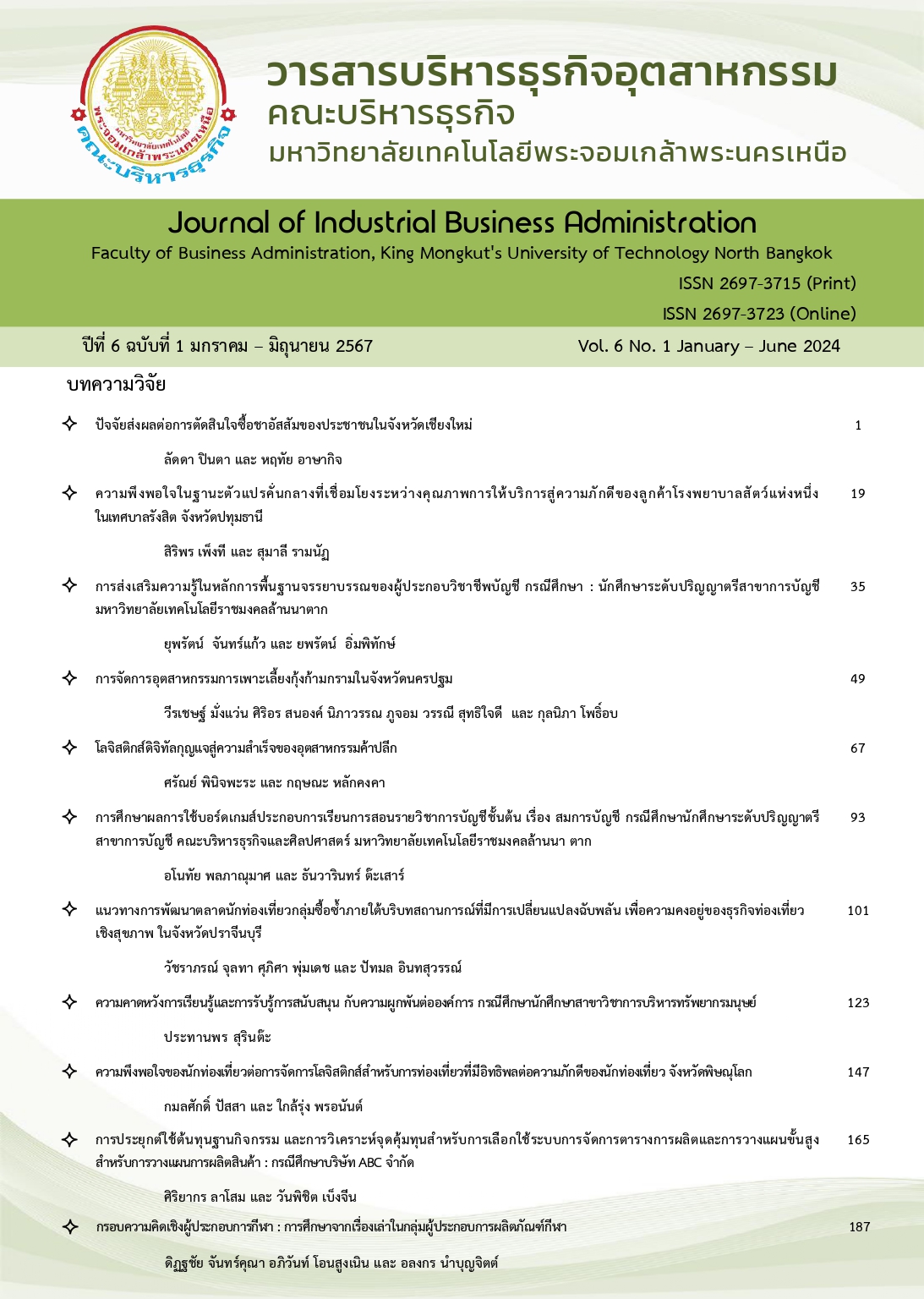Re-purchasing tourists’ development guidelines under the context of VUCA world for the persistence of the wellness tourism business in Prachinburi province
Keywords:
Re-purchasing tourists, VUCA world, Wellness tourism business, Prachinburi provinceAbstract
This research aims to study 1) types of re-purchasing tourists of the wellness tourism business in Prachinburi Province 2) behaviours of re-purchasing tourists for each type in the wellness tourism business in Prachinburi Province and 3) marketing strategies that are appropriate for re-purchasing tourists’ behaviours.To lead to suggesting guidelines for re-purchasing tourists’ development guidelines under the context of VUCA world for the persistence of the wellness tourism business in Prachinburi Province. By collecting data from 2 main groups: 1) tourists who use tourism goods and services in Prachinburi Province During the time the research was conducted, 400 people received questionnaires. Use analytical methods using mathematical packages, and
interpret the results with statistical values, including frequency, percentage, mean, and standard deviation, and 2) 30 specific wellness tourism business entrepreneurs in Prachinburi Province using semi-structured interviews.
Using content analysis methods and interpret the results in a descriptive manner. The research found that health tourists who come back to buy again are family tourists. The number 1 business group in which tourists have repeated trips or used services is the health food restaurant business group 36 %, with the number of repeat trips or health promotion services in Prachinburi province as high as 12 times/year. And marketing strategies used by tourist attractions and wellness tourism service providers through creating tourism experiences with all five senses that are most appropriate to repeat tourist behaviours are: 1) taste sense 2) sight sense and 3) touch sense. In this regard, the other two marketing strategies are at the high and medium levels: smell sense was at a high level and sound sense was at a moderate level, respectively
References
Douglas, A., Hoogendoorn, G. & Richards, G. (2024), "Activities as the critical link between motivation and destination choice in cultural tourism", Journal of Hospitality and Tourism Insights, 7(1), 249-271.
Le, D., Scott, N., & Lohmann, G. (2018). Applying experiential marketing in selling tourism dreams. Journal of Travel & Tourism Marketing, 36(2), 220–235.
Leiper,N. (1990). Tourist attraction systems. Annals of Tourism Research, 17(3), 367-384.
Pesonen, J., Komppula, R., Kronenberg, C., & Peters, M. (2011) "Understanding the relationship between push and pull motivations in rural tourism", Tourism Review, 66(3), 32 - 49.DOI: 10.1108/16605371111175311
กนก บุญศักดิ์, สิทธิชัย พรหมสุวรรณ, เสรี วงษมณฑา, และวาสนา กีรติจำเริญ. (2561). อิทธิพลของปัจจัยที่มีต่อความภักดีของนักท่องเที่ยวต่อการท่องเที่ยวบนฐานชุมชนภาคตะวันออกเฉียงเหนือตอนล่างของประเทศไทย. วารสารชุมชนวิจัย, 12(1), 10-28.
กรุงไทยคอมพาส. (2563, สิงหาคม). เจาะพฤติกรรมท่องเที่ยวใน New Normal: เมื่อโควิดทำชีวิตเปลี่ยน.https://krungthai.com/Download/economyresources/EconomyResourcesDownload_เจาะพฤติกรรมท่องเที่ยวใน New Normal: เมื่อโควิดทำชีวิตเปลี่ยน (krungthai.com).
นิมิต ซุ้นสั้น และศศิวิมล สุขบท. (2563). ความสัมพันธ์เชิงสาเหตุระหว่างภาพลักษณ์แหล่งท่องเที่ยวความผูกพันกับสถานที่ ความพึงพอใจโดยรวม และความตั้งใจเชิงพฤติกรรมของนักท่องเที่ยวชาวตะวันตกในจังหวัดภูเก็ต. จุฬาลงกรณ์ธุรกิจปริทัศน์, 42(1), 68-83.
พรไพลิน จุลพันธ์. (2565, 4 สิงหาคม). จับชีพจร “โรงแรม-เมืองท่องเที่ยว”ภาคใต้ ฟื้นไข้โควิด! หนุนปี 56 โกยยอดต่างชาติ 10 ล้านคน. https://inews.bangkokbiznews.com/read/447509
เพียงใจ คงพันธ์ และภัทราวรรณ วังบุญคง. (2564). ความพึงพอใจของนักท่องเที่ยวชาวไทยที่มีต่อการท่องเที่ยวเขาศูนย์จังหวัดนครศรีธรรมราช. วารสารมนุษยศาสตร์และสังคมศาสตร์ มหาวิทยาลัยราชภัฏอุบลราชธานี, 12(1), 15-29.
รัตนากร สุทธิพงศ์เกียรติ์. (2562, 11 มิถุนายน). สร้าง Brand ผ่าน สัมผัสทั้ง 5 ( รูป รส กลิ่น เสียง สัมผัส ).https://www.demopower.com/th-th/article/transform-the-way-you-build-your-brandsthrough-the-power-of-five-senses/
รุ่งกานต์ แก้วเจริญ, สมนึก เอื้อจิระพงษ์พันธ์, สุพิศ ฤทธิ์แก้ว, จินตนีย์ รู้ซื่อ, และญาณินี ทรงขจร. (2562).แรงจูงใจและพฤติกรรมของนักท่องเที่ยวชาวต่างประเทศที่มีต่อการร่วมงานฟูลมูนปาร์ตี้ เกาะพะงัน จังหวัดสุราษฎร์ธานี. วารสารวิทยาลัยดุสิตธานี, 13(3), 143-163.
วสันต์ กานต์วรรัตน์. (2563). ปัจจัยที่สัมพันธ์กับพฤติกรรมการเลือกใช้บริการที่พักรีสอร์ทของนักท่องเที่ยวในอำเภอสวนผึ้ง จังหวัดราชบุรี. วารสารนวัตกรรมการศึกษาและการวิจัย, 4(2), 157 -170.
วิโรจน์ เลิศจิตต์ธรรม. (2564, 19 พฤศจิกายน). ILO เผย การล่มสลายของอุตสาหกรรมท่องเที่ยวจากวิกฤตโค วิด ส่ งผ ลให้ ค น ไท ยแล ะอีก 4 ป ระเท ศ ใน เอเชีย ต กงาน รวม กั น กว่า 1.6 ล้ าน ค น .https://thestandard.co/the-collapse-of-the-tourism-industry-from-the-covid-crisis/
สนิทเดช จินตนา และอารีวรรณ หัสดิน. (2563). ปัญหาความปลอดภัยในชีวิตและทรัพย์สินในการท่องเที่ยวกรุงเทพมหานคร ในมุมมองของนักท่องเที่ยวต่างชาติ. วารสารศิลปศาสตร์ มทร.ธัญบุรี, 1(2), 33 -43.
สำนักข่าว Hfocus เจาะลึกระบบสุขภาพ. (2560, 10 มีนาคม). ยกระดับ ‘ธุรกิจสมุนไพรอภัยภูเบศร’สร้างเศรษฐกิจชาติ ตั้งเป้าผู้นำตลาดอาเซียนใน 3 ปี, https://www.hfocus.org/content/2017/03/13570
สุบัญชา ศรีสง่า และสมยศ วัฒนากมลชัย. (2564). โมเดลเชิงสาเหตุของความตั้งใจกลับมาท่องเที่ยวแบบเนิบช้าซ้ำโดยมีพฤติกรรมเป็นตัวแปรส่งผ่าน. วารสารการบริการและการท่องเที่ยวไทย, 16(1), 56- 66.
องค์การแรงงานระหว่างประเทศ. (2564, 18 พฤศจิกายน). ผลกระทบขนาดใหญ่ของโควิด 19 ต่อการจ้างงานในภาคการท่องเที่ยวในเอเชียแปซิฟิค งานวิจัยของ ไอแอลโอ. https://www.ilo.org/asia/mediacentre/news/WCMS_827625/lang--en/index.htm
อนุรักษ์ ทองขาว, พรรณภัทร แซ่โท้ว และสยานนท์ สหุนันต์. (2563). ปัจจัยที่มีอิทธิพลเชิงสาเหตุต่อความภักดีของนักท่องเที่ยวเมืองรองติดชายฝั่งทะเลภาคตะวันออก. Dusit Thani College Journal, 14(3),162 – 177.
อรรทวิท ศิลาน้อย, ณัฏฐพงษ์ฉายแสงประทีป, วันทกาญจน์ สีมาโรจน์ และวัฒนา ทนงค์แผง. (2562).ความต้องการด้านสิ่งอำนวยความสะดวกของนักท่องเที่ยวในพระบรมธาตุนาดูน สำหรับการท่องเที่ยวเพื่อคนทั้งมวล. วารสารมนุษยศาสตร์ และสังคมศาสตร์, 10(2), 130-143.
เอสเอ็มอี ไทยแลนด์. (2566, 10 พฤศจิกายน). ถอดรหัส Soft Power คนไทยอยากสำเร็จต้องทำอย่างไร?.https://www.smethailandclub.com/marketing/9336.html
Downloads
Published
How to Cite
Issue
Section
License
Copyright (c) 2024 Journal of Industrial Business Administration

This work is licensed under a Creative Commons Attribution-NonCommercial-NoDerivatives 4.0 International License.



